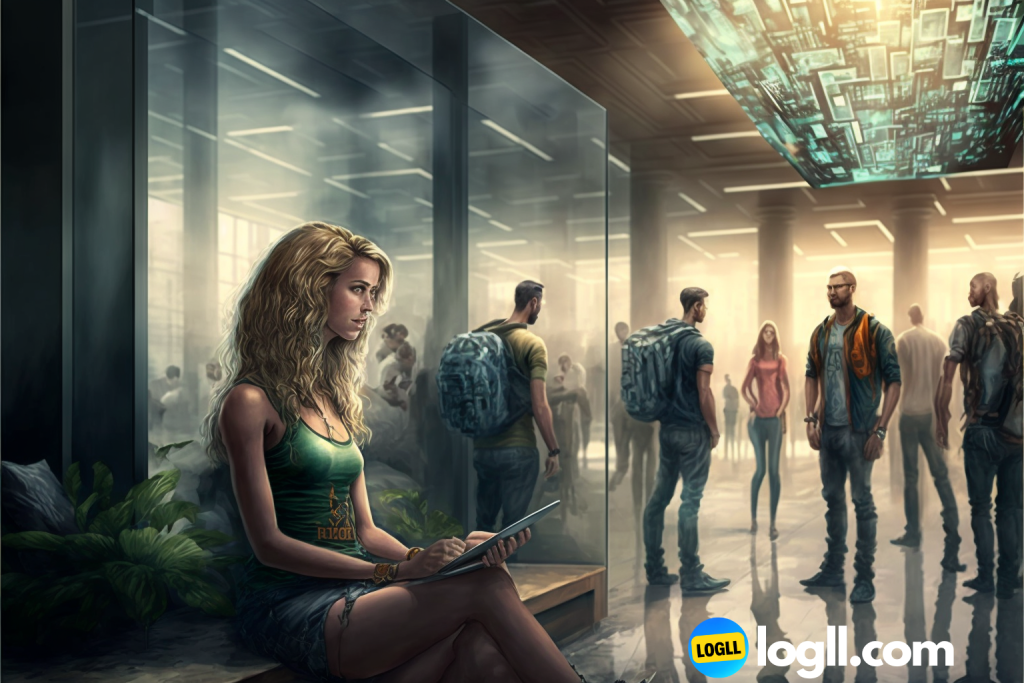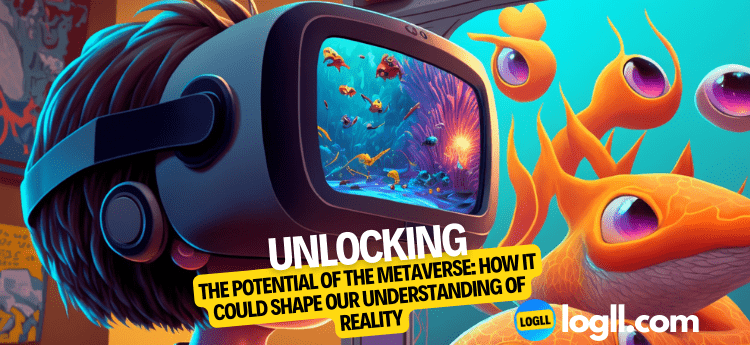With the advent of the internet, our world has become increasingly connected. We now can connect with people and businesses all over the globe, and share information instantaneously. The internet has also given rise to new industries and business models.
But what if the internet went one step further?
What if it became a 3D representation of the world we live in, where people, businesses, and objects could interact in a virtual space? This is the concept of the metaverse.
The metaverse has the potential to change the way we live, work, and play. In this article, we’ll explore the implications of the metaverse for our world. We’ll look at the economic, social, and political implications of this new technology, and how we can take advantage of it.

We’ll also discuss some risks associated with the metaverse, such as cybersecurity threats and risks to privacy.
What is the metaverse?
The Metaverse is a shared, virtual space that is created by the convergence of the physical and the digital world. The Metaverse has the potential to change the way we live, work, and play. It presents both opportunities and risks that we need to be aware of.

The Metaverse is a place where people can create avatar representations of themselves and interact with others in a virtual environment. People can buy, sell, or trade virtual goods and services in the Metaverse. They can also gamble, play games, or socialize with others.

The Metaverse offers opportunities for businesses to reach new markets and for individuals to connect with others from around the world. However, there are also risks associated with the Metaverse, such as cybersecurity threats and risks to privacy.
❤️ Please Retweet ❤️
— Logll Tech News (@LogllNews) January 25, 2023
👉 Aloha! These cows are ready for a Hawaiian vacation in style with their lei #cowsofhawaii #funnyanimals #cowslei #beachcows
😎👉 Watch videos for $0.00 with Prime:https://t.co/l6qsb9MAuY pic.twitter.com/LUB74Xl18y
⭐️⭐️⭐️⭐️⭐️ Cool Gadgets
MOKOQI Magnetic Levitating Globe with LED Light, Cool Tech Gift for Men Father Boys, Birthday Gifts for Kids, Floating Globes World Desk Gadget Decor in Office Home /Display Frame Stand
ROKR 3D Wooden Puzzles for Adults, DIY Wooden Ballista Launcher Toys Building Model Kits STEM Projects Toys for Boys/Girls
HypnoCube 4 Cube, Animated Light Sculpture
$99.99
History
The Metaverse has its origins in science fiction. One of the earliest examples of the concept can be found in Neal Stephenson’s 1992 novel Snow Crash, in which the protagonist enters a virtual world that is a three-dimensional representation of the Internet. The novel popularized the term “Metaverse” and helped to establish the concept in popular culture.

Other examples of the Metaverse can be found in films such as The Matrix (1999), in which characters enter a virtual world that is controlled by artificial intelligence, and Ready Player One (2018), in which people escape from their difficult lives into a virtual world called the OASIS.


The Metaverse has also been envisioned as a shared virtual reality, where people can interact with each other and with digital objects. This vision was popularized by the VR MMORPG Second Life (2003), in which players created avatars and explored a 3D virtual world.

The Metaverse has the potential to change the way we live, work, and play. For example, it could provide a new platform for online shopping, allow us to work remotely in virtual offices, and enable us to visit virtual tourist destinations. It also presents risks, such as data privacy concerns and the possibility of addiction.

Ultimately, the Metaverse is an evolving concept with a long history. It has been variously envisioned as a shared virtual reality, a 3D representation of the Internet, and a platform for escapism. It’s potential to change the way we live, work, and play make it an important topic of discussion.



(Image credit: logll.com)
What are the implications of the metaverse for our world?
In this section, we’ll explore some implications of the metaverse for our world.
The metaverse will have a profound impact on the economy. Businesses will be able to operate in a virtual space, which could lead to a reduction in overhead costs. Additionally, there will be new opportunities for businesses to generate revenue through the sale of virtual goods and services. The metaverse will also create new jobs that don’t exist today. For example, businesses will need people to design and manage their virtual spaces.

The metaverse will also impact social interactions. People will be able to meet and interact with each other in a virtual space. This could lead to new forms of social interaction that we haven’t even thought of yet. Additionally, the metaverse will provide new opportunities for people to connect with each other. For example, people with shared interests will be able to find each other more easily and connect on a deeper level.

The metaverse will also have an impact on politics. Politicians will be able to reach out to constituents in a virtual space. This could lead to more effective campaigning and engagement with constituents. Additionally, the metaverse will provide new opportunities for political organizing around shared interests.

Ultimately, the metaverse presents both opportunities and risks that we need to be aware of.
Economic implications
The way we interact with each other will change: The Metaverse will change the way we interact with each other.

For example, you may be able to attend a virtual concert with your friends, or visit a virtual museum together. This would have a profound impact on social interactions and could lead to a more connected world.

Politics will be transformed: The Metaverse will transform politics.
For example, people may be able to vote in elections from their homes in the virtual world. This would increase participation in democracy and could lead to more informed and engaged citizens.
Social implications
The Metaverse allows people to connect with each other in ways that were not possible before. People will be able to interact with each other in a virtual space that is not constrained by time or location. This will give rise to new social networks and interactions.

The Metaverse will redefine what it means to be human. We will no longer be constrained by our physical bodies and will be able to interact with each other and the world around us in new and exciting ways.


(Image credit: logll.com)
Political implications
The Metaverse will have profound implications for the way we conduct politics. It will change the way political campaigns are run, and increase the importance of digital diplomacy. Additionally, it will create new opportunities for political advocacy and activism.
The Metaverse will have a major impact on the way political campaigns are run. In the past, candidates would campaign in person, shakes hands, and kiss babies. But in the Metaverse, candidates will be able to reach a much larger audience with their message. They will be able to hold rallies and make speeches that can be attended by people from all over the world. Additionally, they will be able to target their message to specific demographics and interest groups.

The Metaverse will also increase the importance of digital diplomacy. In the past, diplomacy has been conducted mostly through face-to-face meetings between officials from different countries. But in the Metaverse, diplomats will be able to hold virtual meetings and negotiate deals without having to leave their home country. This will make it easier for countries to communicate with each other and reach agreements on a variety of issues.
The Metaverse will also create new opportunities for political advocacy and activism. In the past, activist groups have had to rely on traditional methods of campaigning, such as marches and protests. But in the Metaverse, they will be able to hold virtual rallies and demonstrations that can reach a global audience. Additionally, they will be able to use avatars to engage in direct action, such as protesting in front of government buildings or corporate headquarters.
![]()
Finally, the Metaverse will have implications for the jurisdiction of nation-states. In the past, nation-states have been sovereign entities with well-defined borders. But in the Metaverse, there will be no physical borders between states. This could lead to a situation where nation-states are competing for citizens based on their policies and regulations. Additionally, it could lead to a situation where individuals are not subject to any one nation-state’s laws or regulations.
How can we take advantage of the metaverse?
The Metaverse can be used to create experiences that are not possible in the physical world.


The Metaverse can also be used as a space for people to connect with others who share their interests. This is especially valuable for people who live in remote areas or who have difficulty meeting people in person. The Metaverse can provide a sense of community and belonging for those who might otherwise feel isolated.
Metaverse also offers new ways to make money. For example, businesses can charge for access to their virtual store or event. They can also sell virtual products and services. This provides a new revenue stream for businesses and opens up opportunities for entrepreneurs.
What are the risks of the metaverse?
The Metaverse could be used for criminal activities, as it would provide a space for criminals to meet and plan their activities without being detected by law enforcement.

The Metaverse could also be used to spread misinformation, as it would be easy to create fake news stories or create false information about a product or service to mislead people.
Additionally, the Metaverse could be used to exploit and harass people, as it would be easy to create anonymous accounts and target people with hateful or threatening messages.
Cybersecurity risks
The Metaverse will present a new attack surface for hackers to exploit. Organizations that operate in the metaverse will need to invest in cybersecurity to tacks. Individuals who use the metaverse will need to be aware of the risks and take steps to protect themselves.
There are some reasons why the metaverse will be a target for hackers. First, the metaverse will be built on top of existing infrastructure, which means that it will inherit all the cybersecurity risks that currently exist. Second, the metaverse will provide a new attack surface for hackers to exploit. Third, organizations that operate in the metaverse will have to invest in cybersecurity to protect themselves from attacks. Fourth, individuals who use the metaverse will have to be aware of the risks and take steps to protect themselves.

Hackers could target the metaverse to gain control of people’s avatars or steal their personal information. Additionally, since the metaverse will be built on top of existing infrastructure, it will inherit all the cybersecurity risks that currently exist. This means that there is a risk that hackers could target the infrastructure itself to disrupt or damage it.
Organizations that operate in the metaverse will need to invest in cybersecurity to protect themselves from attacks. They will also need to educate their employees about the risks associated with operating in the metaverse and how they can protect themselves. Individuals who use the metaverse will have to be aware of the risks and take steps to protect themselves. This includes being careful about what information they share and only downloading applications from trusted sources.
Risks to privacy
The Metaverse will know your every move, your real identity could be revealed. You could also be targeted for ads based on your behavior in the Metaverse. Additionally, your data could be used to influence your behavior in the Metaverse. Finally, the Metaverse could be used to track your physical location.
Conclusion
In conclusion, the Metaverse has the potential to change the way we live, work, and play. It will have implications for our economy, society, and politics. We must be thoughtful about how we take advantage of the Metaverse while mitigating the risks.
Join Our Newsletter
FAQs
A: The Metaverse is a shared, virtual space that is created by the convergence of the physical and the digital world. It is a 3D representation of the internet where people, businesses, and objects interact in a virtual world. It has the potential to change the way we live, work, and play.
A: The metaverse has potential implications for the economy, society, and politics. It offers opportunities for businesses to reach new markets and for individuals to connect with others from around the world. However, there are also risks associated with the metaverse, such as cybersecurity threats and risks to privacy.
A: In the metaverse, people can create avatar representations of themselves and interact with others in a virtual environment. They can buy, sell, or trade virtual goods and services, gamble, play games, or socialize with others.
A: The metaverse offers opportunities for businesses to reach new markets and connect with consumers in new ways. It could also enable new business models and revenue streams.
A: There are risks associated with the metaverse such as cybersecurity threats, risks to privacy, and potential negative impact on real-world economy and society. It’s important to be aware of these risks and take steps to mitigate them as the metaverse continues to develop.
A: The concept of the metaverse originated from science fiction, with one of the earliest examples found in Neal Stephenson’s 1992 novel Snow Crash. The novel popularized the term “Metaverse” and helped establish the concept in popular culture.
A: Examples of the metaverse can be found in films such as The Matrix (1999) and Ready Player One (2018), and in the VR MMORPG Second Life (2003).
A: The metaverse has the potential to change the way we live, work, and play. For example, it could provide a new platform for online shopping, allow us to work remotely in virtual offices, and enable us to visit virtual tourist destinations. It also presents risks, such as data privacy concerns and the possibility of addiction.
A: The metaverse will impact social interactions by enabling people to meet and interact with each other in a virtual space. This could lead to new forms of social interaction that haven’t been thought of yet and provide new opportunities for people to connect with each other.
A: The metaverse will have an impact on politics by enabling politicians to reach out to constituents in a virtual space and providing new opportunities for political organizing around shared interests. The metaverse presents both opportunities and risks that we need to be aware of.
A: The metaverse will change the way we interact with each other by enabling people to attend virtual events and visit virtual spaces together, leading to a more connected world and new forms of social interactions.
A: The metaverse will transform politics by enabling people to vote in elections from their homes in the virtual world, increasing participation in democracy and leading to more informed and engaged citizens.
A: The metaverse will allow people to connect with each other in ways that were not possible before, giving rise to new social networks and interactions and redefining what it means to be human.
A: The metaverse will impact political campaigns by enabling candidates to reach a much larger audience with their message, target their message to specific demographics and interest groups, and hold virtual rallies and speeches.
A: The metaverse will increase the importance of digital diplomacy by enabling diplomats to hold virtual meetings and negotiate deals without having to leave their home country. It will also create new opportunities for political advocacy and activism, such as virtual rallies and demonstrations that can reach a global audience, and direct action through avatars. It will also have implications for the jurisdiction of nation-states, as there will be no physical borders between states in the metaverse.
A: Businesses can use the metaverse to create virtual stores or product demonstrations that can be tailored to the specific needs of the customer, providing a more personalized service.
A: Businesses can use the metaverse to create virtual events such as concerts or conferences, which offers them a unique opportunity to reach a wider audience.
A: The metaverse can be used as a space for people to connect with others who share their interests, especially for people who live in remote areas or have difficulty meeting people in person. It can provide a sense of community and belonging for those who might otherwise feel isolated.
A: The metaverse can open up new revenue streams for businesses, such as charging for access to virtual stores or events, and selling virtual products and services. It also offers new opportunities for entrepreneurs.
A: The metaverse offers new ways of making money, such as charging for access to virtual stores or events, selling virtual products and services, and creating new business models. It also opens up opportunities for entrepreneurs to create new revenue streams.
A: The metaverse could be used for criminal activities such as planning and coordinating activities without detection by law enforcement, spreading misinformation, and exploiting and harassing people.
A: The metaverse presents a new attack surface for hackers to exploit, and organizations and individuals will need to invest in cybersecurity measures to protect themselves from potential attacks. Hackers could target the metaverse to gain control of people’s avatars or steal personal information, and could also target the underlying infrastructure.
A: The metaverse could potentially know your every move and reveal your real identity, target you with ads based on your behavior, use your data to influence your behavior, and track your physical location.
A: Organizations that operate in the metaverse should invest in cybersecurity measures to protect themselves from attacks and educate their employees about the risks associated with operating in the metaverse and how to protect themselves.
A: Individuals who use the metaverse should be aware of the risks and take steps to protect themselves, such as being careful about what information they share and only downloading applications from trusted sources.








